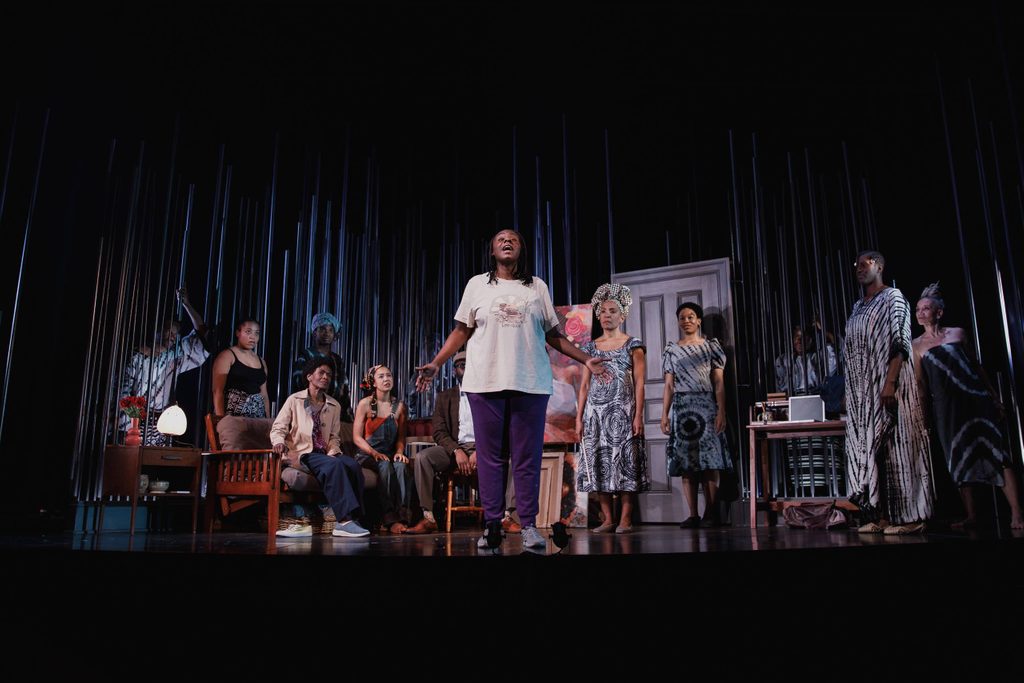
‘The Grove’ – Written by Mfoniso Udofia. Directed by Awoye Timpo. Scenic Design by Jason Ardizzone-West; Costume Design by Sarita Fellows; Lighting Design by Reza Behjat; Sound Design and Original Music by Rob Milburn and Michael Bodeen. Produced by The Huntington Calderwood at BCA Plaza Theatre at 539 Tremont Street, Boston, through March 9.
By Shelley A. Sackett
Anyone remotely interested in the Boston theater scene is aware of the city-wide, unprecedented commitment to present Mfoniso Udofia’s Ufot Family Cycle over the next couple of years. These nine plays follow a Nigerian family in America and Africa through 40 years and three generations. The first, “Sojourners,” premiered at The Huntington last fall to universal praise. In it, audiences were introduced to Adiaha, the first American-born daughter born to Nigerian immigrants Abasiama and her husband Ukpong. The setting is 1970s Houston, where Abasiama studies hard and works in a gas station to make ends meet. When Ukpong goes AWOL, Disciple Ufot befriends and eventually marries her, raising Adiaha as his own. Like Abasiama, Disciple is studious and hardworking, with a plan, like hers, to return to Nigeria upon graduation. Unlike Abasiama, he is also intensely religious.
The Huntington continues with its world premiere of ‘The Grove,’ the second play in the cycle, which picks up the Ufot family story 30 years later, in 2009 in Worcester. Family and friends have gathered to fête and honor Adiaha (a magnificent Abigail C. Onwunali) after her graduation with a master’s degree in creative writing.
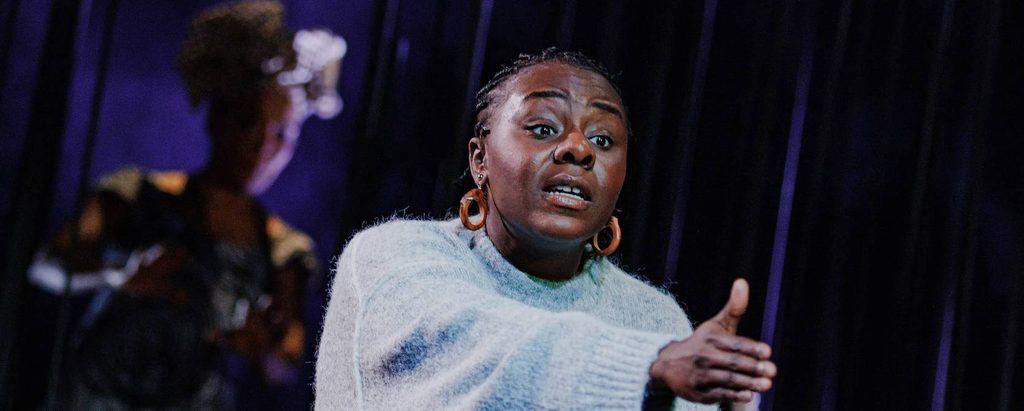
The pre-party atmosphere is anything but festive. Her father, Disciple (Joshua Olumide), sings Ibibio praise songs while relentlessly and neurotically barking orders at Adiaha and her younger siblings, sister Toyoima (a very good Aisha Wura Akorede) and brother Ekong (Amani Kojo). Nothing is clean enough; nothing is good enough. Every minute is spiritual warfare.
Toyoima and Ekong, who still live under Disciple’s roof, tolerate his harangues, complying with just enough teen attitude to satisfy their need to feel like they are dissing him, yet not so much to risk his catching on.
Adiaha, on the other hand, is walking on eggshells. She defers to Disciple, cajoling her siblings to humor him. She is, after all, the one child Disciple trusts with his legacy. It is a great honor; it is an even greater burden. That legacy is a collectivist Nigerian culture where values of family and community eclipse the individual and her particular emotional and psychological needs. Adiaha is, and has always been, the daughter who made her family proud and internalized and externalized her Nigerian roots. Even today, as her increasingly frantic father sputters and verbally abuses his family, she is the compliant one, humoring him while urging her siblings to just play along and keep the peace in the house.
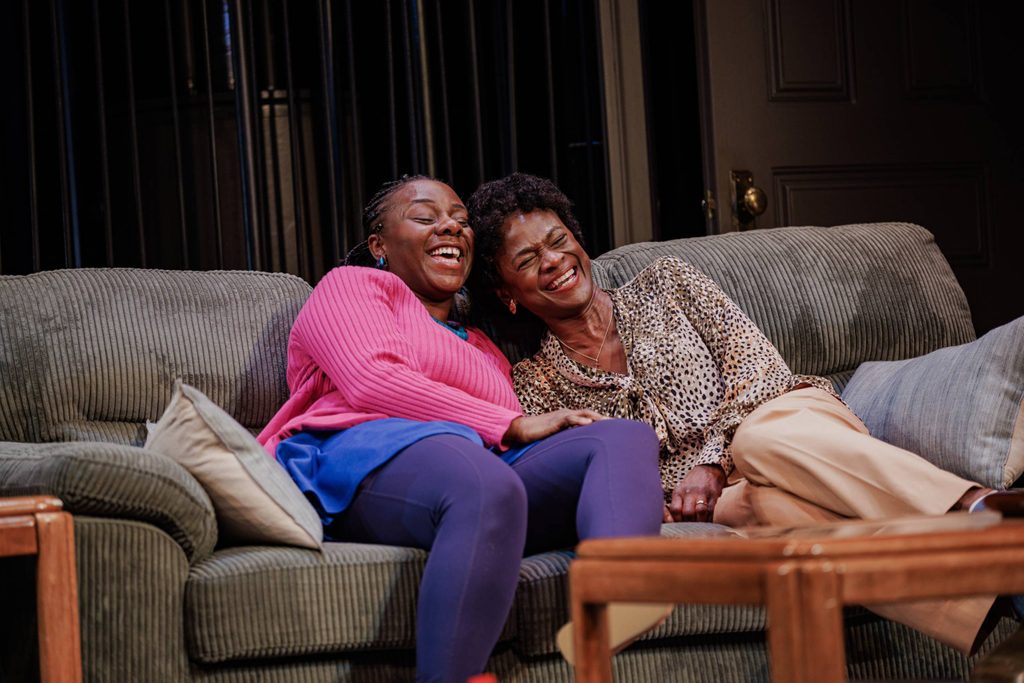
If Adiaha looks adrift and uneasy — and she does — she has every reason to. She is a lesbian, sharing her small apartment with her artist childhood best friend, Kim (Valyn Lyric Turner). She has led a closeted life as far as her family goes, that is, until her mother recently found out and was devastated. Her father remains clueless. If he finds out the truth about her queerness, his image of her will implode (as might he).
The set changes to Adiaha’s childhood bedroom, where she busies herself throwing the trophies that line her shelves into her trash basket, ridding herself of “the kid I was.” Emmy Award-winning scenic designer Jason Ardizzone-West has created a rotating set that is like a crème-filled cookie — the outsides are the family living room, Adiaha’s bedroom in Worcester, and later, her apartment in Brooklyn.
The rich middle is a grove of metal poles. Five female “Shadows,” dressed in traditional garb, live in this middle ground, dancing and chattering and chanting in Ibibio (Nigeria’s native language). They beckon to Adiaha. While they and their staging are captivating, their role is not just as artistic eye and ear candy. They are storytellers who tell their tales through choreography and language. They will show Adiaha that she can be true to herself while still being part of a rich heritage that only became patriarchal and homophobic with the advent of colonialism. They want to help her with safe passage from past to present to future, a true rebirth into a world of self-acceptance and cultural pride. (Kudos to director Awoye Timpo for her steady, light touch).
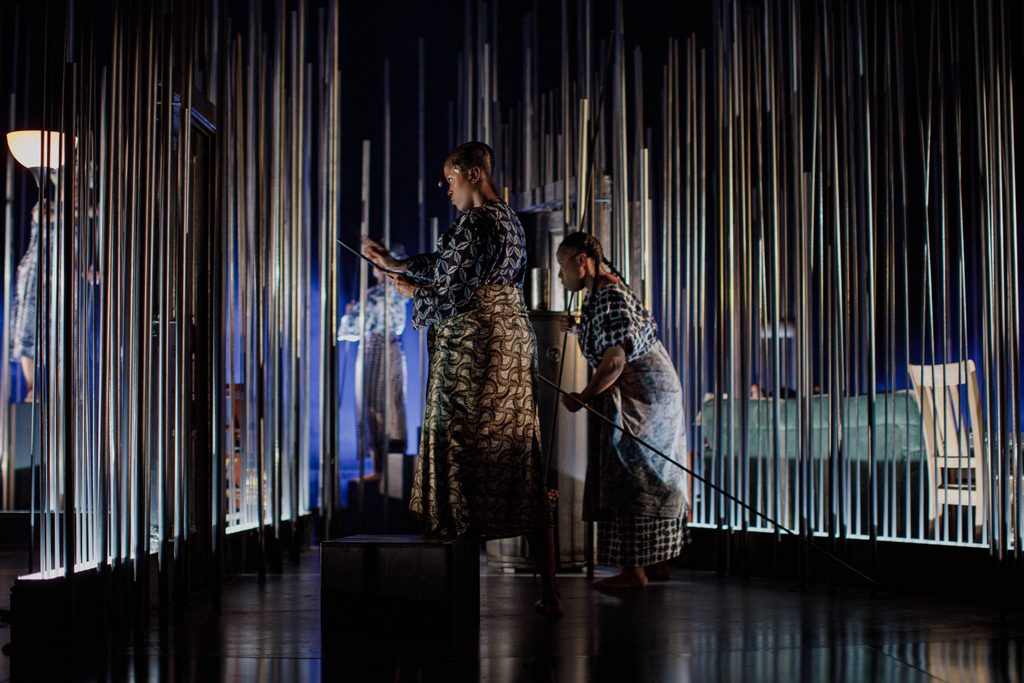
Meanwhile, however, Adiaha is in a pickle. Her father has gathered Udosen (the magnetic Paul-Robert Pryce), her assimilated, “fun” uncle, and Maduka Steady (Godwin Inyang), the “stodgy” uncle who wears his Nigerian garb as if wielding a royal scepter. The conversation among the men centers on despair over the plight of their heritage at the hands of the young who have adapted in America by embracing, for example, all matters of things that involve earplugs.
“Look at our history. When did we lose our way?” Disciple and Maduka lament.
While the men try to relegate women to subservient roles, the scenes between Adiaha and her mother, Abasiama (Patrice Johnson Chevannes) and sister Toyoima are among the most poignant and revealing. Adiaha’s younger sister tries in vain to get her to confide in her as a way to ease her pain and grease the wheels to her freeing herself from her father’s yoke. Her mother admits that her father is difficult and getting worse, yet she values and, therefore, must prioritize her tribal heritage over her personal happiness.
“Continuing the line is the most important thing in life,” she admonishes. “If you are a lesbian, then you can’t have a child…Sometimes life is sacrifice. Putting aside what you feel for what is righteous.”
Act II of the 1 hour 45 minute (1 intermission) play opens with a prolonged scene that sheds light on Adiana and Kim’s relationship. Although going through a rough patch, it’s clear that the two share a bond that goes deeper than girlfriends; they truly are soulmates, able to talk and share in intimate and revealing ways. When Adiana begins speaking Ibibio in her sleep, we sense the possibility of a bridge between past and present.
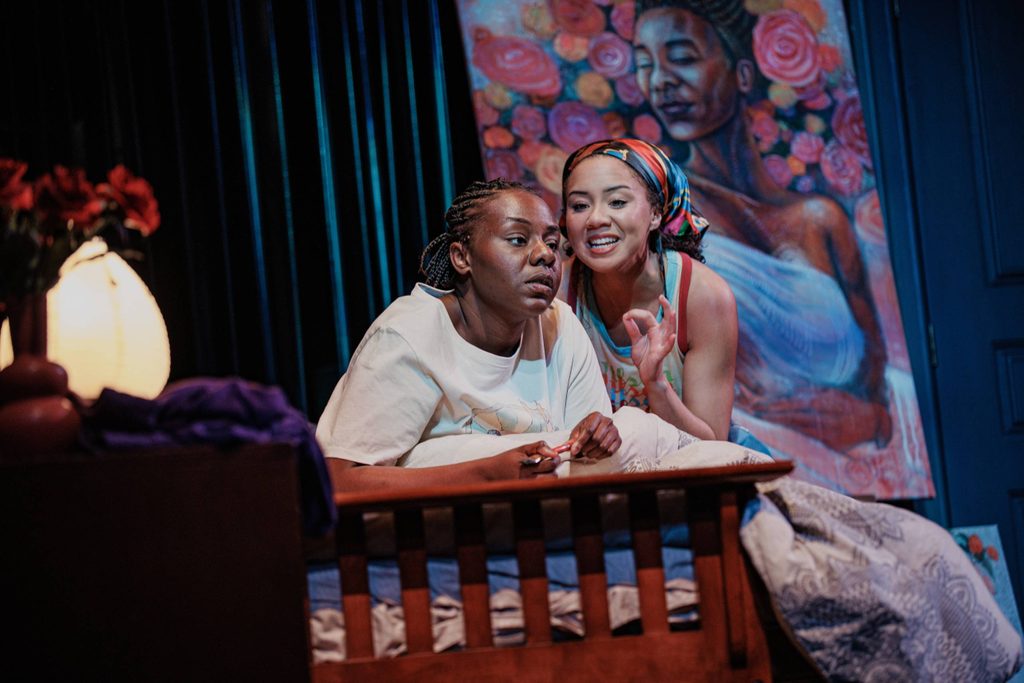
Eventually, Adiaha learns (with guidance and help from the Shadows) that she can indeed be the way she is and still be Nigerian. She is a tree who finds her grove and is not alone. Just like when she was a child, all will be good again.
Playwright Udofia, a Southbridge native, started writing ‘The Grove’ in 2009 but put it aside as she struggled with her own issues about being both Nigerian and queer. Luckily, she returned to the work once she realized that the collective could honestly and naturally hold everyone — including a queer Nigerian — and that there were deep roots that existed even for her. Part three of the Ufot Family Cycle, runboyrun, will be produced as an audio play adaptation by Next Chapter Podcasts in partnership with GBH with readings held at Boston Public Library – Central Library: GBH Studio & The Huntington Theatre. I, for one, can’t wait.
Note: Although the cast of 13 is a terrific ensemble, Olumide might choose to reread playwright Udofia’s character notes, which describe Disciple as “not a one-dimensional monster; he is a complex human being. He displays signs of PTSD/emotional and psychological distress, the influence of traditional Nigerian cultural norms and patriarchy, as well as bad behavior.” Olumide’s unnuanced version on opening night was frantic and loud, leaving little room for audience empathy.
For more information and to buy tickets, go to https://www.huntingtontheatre.org/

